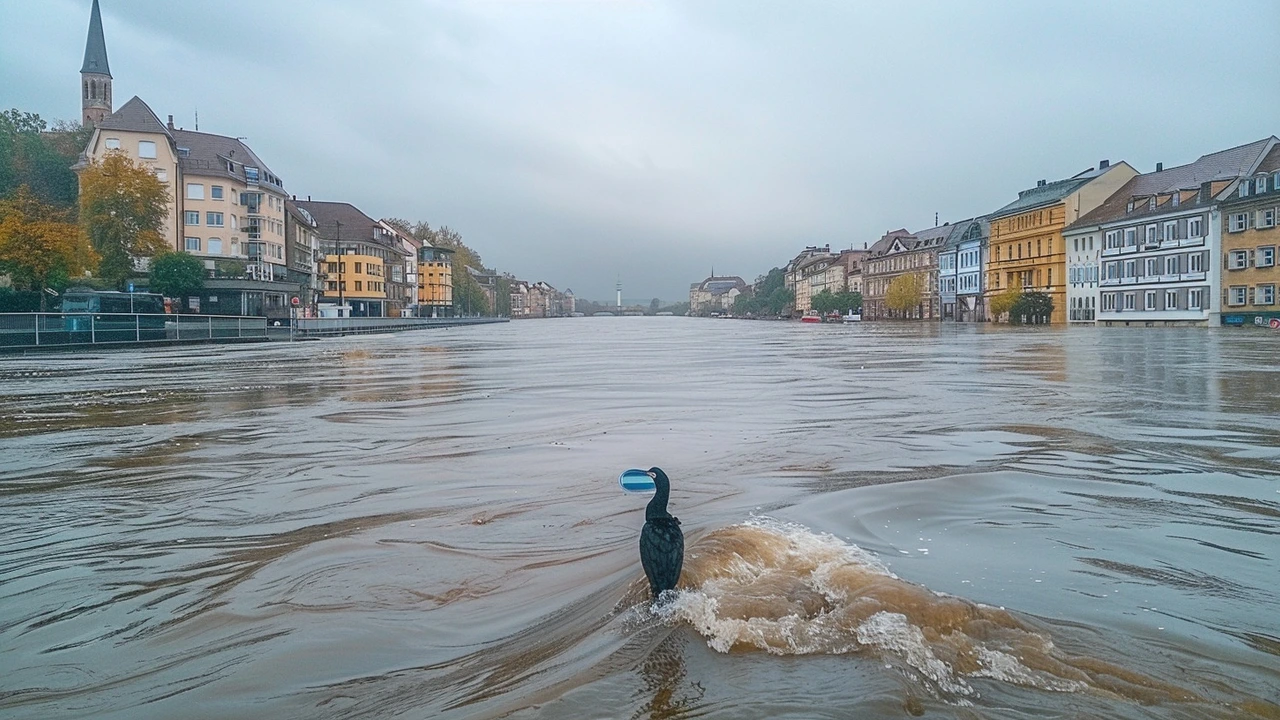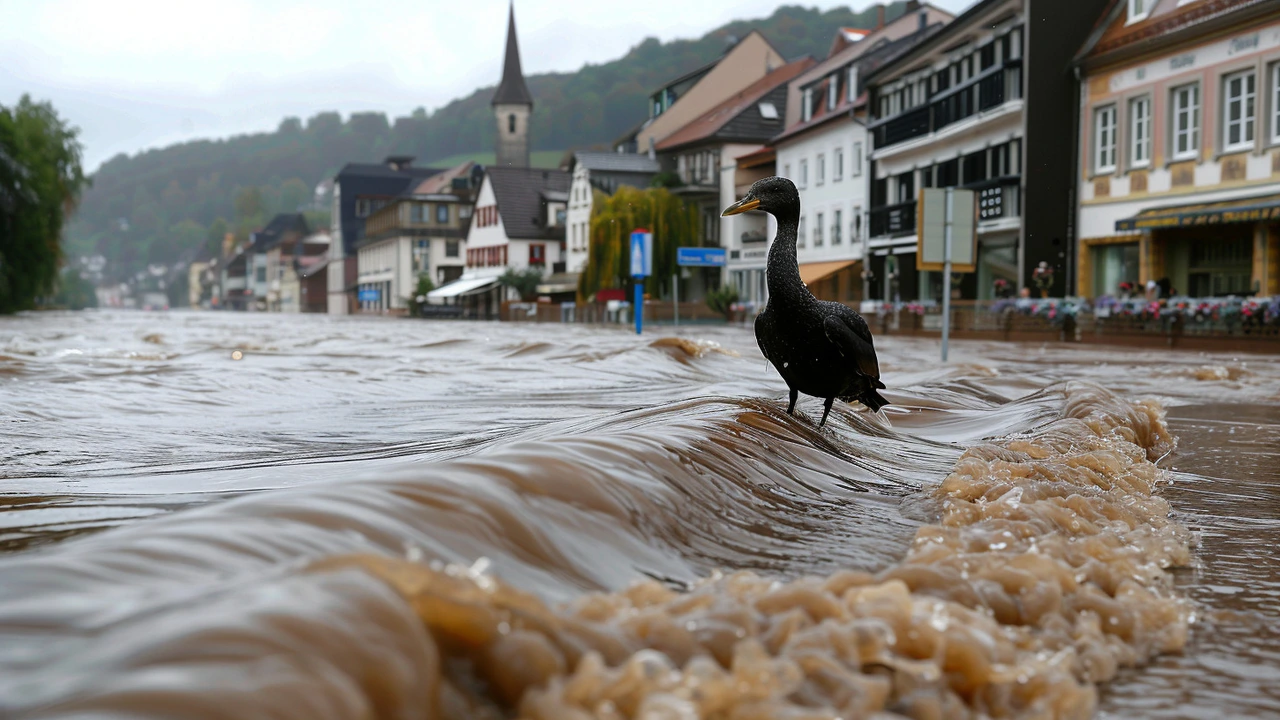Heavy Rains Unleash Destruction in Southern Germany
Over the weekend, heavy rains wreaked havoc across southern Germany, leading to extensive flooding in the states of Bavaria and Baden-Wuerttemberg. The deluge has tragically resulted in the deaths of at least four individuals. In one grim instance, a 43-year-old woman was discovered in a flooded cellar in Schrobenhausen, Bavaria. Furthermore, emergency responders recovered the bodies of a man and a woman from another flooded basement in Schorndorf, near Stuttgart.
The rain fell in torrents, overwhelming local water management systems and inundating streets and buildings alike. Rescue operations have been ceaseless, with emergency crews working around the clock to aid those trapped by the rising waters. The government has been on high alert, facing the dual challenge of managing immediate rescue efforts and addressing the long-term implications of such disasters. Particularly affected areas are contending with severe water damage to homes, infrastructure, and public property.
Political Leaders Respond to the Crisis
With the floodwaters causing such widespread obstruction and tragedy, political leaders have made it a priority to visit the hardest-hit areas. Chancellor Olaf Scholz traveled to Reichertshofen to personally assess the situation and show support to the local communities and rescue teams diligently working to restore normalcy. The visit included discussions with regional officials, among them Bavaria’s Governor Markus Söder, who provided a critical overview of the ongoing efforts.
Governor Söder described the situation as both critical and tense. While there had been some hope with water levels receding in a few locations, the threat was far from over as new flooding and the need for further evacuations persisted. The sheer unpredictability of water levels has kept emergency services on their toes, prepared for the worst while hoping the worst is behind. These leaders emphasize the importance of organized, robust rescue and relief frameworks to deal with such unprecedented natural calamities.
The Broader Implications of Climate Change
In his visit, Chancellor Scholz highlighted the broader issue that these events underscore: man-made climate change. The pattern of increasingly frequent and severe weather events cannot be ignored, and Scholz strongly conveyed that the country needs to intensify its efforts to battle climate change. Scholz remarked, “This succession of floods serves as an unmistakable reminder that combating climate change must be a top priority. It is an undertaking that we cannot neglect.”
Environmental experts have long warned that the ramifications of climate change will make such natural disasters more frequent and more severe. The impact is evident: from extreme flooding to devastating wildfires, the weather phenomena fueled by changing climate patterns are becoming the new norm. Comprehensive strategies must be adopted globally to mitigate these effects, and Germany's recent ordeal serves as a stark reminder and call to action.

Disruption to Daily Life
The floods have not only claimed lives and caused physical destruction but have also wrought significant disruptions to daily life. Foremost is the distress caused by transportation issues. The flooding led to the immediate halt of long-distance rail routes to Munich, one of the primary transportation hubs. This disruption has affected countless travelers and commuters, exacerbating the chaos brought on by the disaster.
Local authorities and the rail service providers have been scrambling to restore service, but the saturated landscape has made immediate recovery a formidable challenge. In addition to railway disruptions, road networks across the afflicted regions have been compromised. Floods have washed away sections of roads, rendering some places inaccessible. Emergency crews have been establishing alternative routes where possible, but the mobility of residents and response teams is significantly hampered.
Relief and Support Measures
Efforts to provide relief and support to affected individuals and communities have been robust and multifaceted. Shelters have been set up to house those displaced by the flooding. Volunteers, local organizations, and government bodies are coordinating to ensure that basic needs such as food, water, and medical care are met. The solidarity and community spirit have been commendable, showcasing the resilience and compassion of the human spirit in times of crisis.
Moreover, financial aid is also being mobilized. The government is reviewing and enacting measures to provide compensation and assistance to those who have suffered property loss and damage. Such initiatives are crucial for helping communities rebuild and recover in the aftermath of this natural calamity. A potential long-term outcome is the push for better urban planning and engineering solutions designed to withstand such extreme weather events.
Key Factors and Lessons Learned
There are several key factors and lessons to be drawn from the recent floods in southern Germany. One glaring issue is the need for more resilient infrastructures capable of withstanding severe weather events. This involves re-evaluating building codes, and improving water management systems, especially in flood-prone areas. The effectiveness of early warning systems is also under scrutiny; timely and precise warnings could potentially prevent such high fatalities and allow better-preparedness for those in danger zones.
Another vital point to consider is the importance of community and governmental collaboration. When communities and governments work hand-in-hand, it amplifies the efficiency and effectiveness of response measures. Additionally, public education on emergency preparedness can play a significant role in minimizing risks during such unpredictable natural events. The creation of robust public crisis management programs, emphasizing swift emergency response and community readiness, is a must.

The Road Ahead
The path ahead is fraught with both challenges and opportunities. As southern Germany begins its long road to recovery, the focus will not just be on rebuilding what was lost but also on building it better and more resiliently. This disaster brings to the fore the urgent need for Germany, and indeed the world, to double down on combating climate change and improving disaster preparedness. The country's experience serves as a poignant reminder of the vulnerability of human settlements to the forces of nature.
Furthermore, there is an evident need to invest in scientific research aimed at better predicting and managing such events in the future. Improved prediction models, enhanced communication channels, and more effective deployment of resources during calamities can all contribute to reducing the impact of such disasters. The onus lies not just on policymakers, but also on communities, to stay informed and stay prepared. Education, awareness, and proactivity are the cornerstones of enduring such future eventualities.
Conclusion
In summary, the floods in southern Germany have brought tragedy and disruption to many, shining a stark light on the persistent threats posed by climate change. The situation remains critical, with affected areas grappling with immediate and long-term recovery efforts. Political leaders, regional authorities, and communities are coming together to address the immediate crisis and laying the groundwork for future resilience. Equipped with lessons learned, Germany stands at a crucial juncture in addressing the forces of nature and the broader implications of our changing climate.

